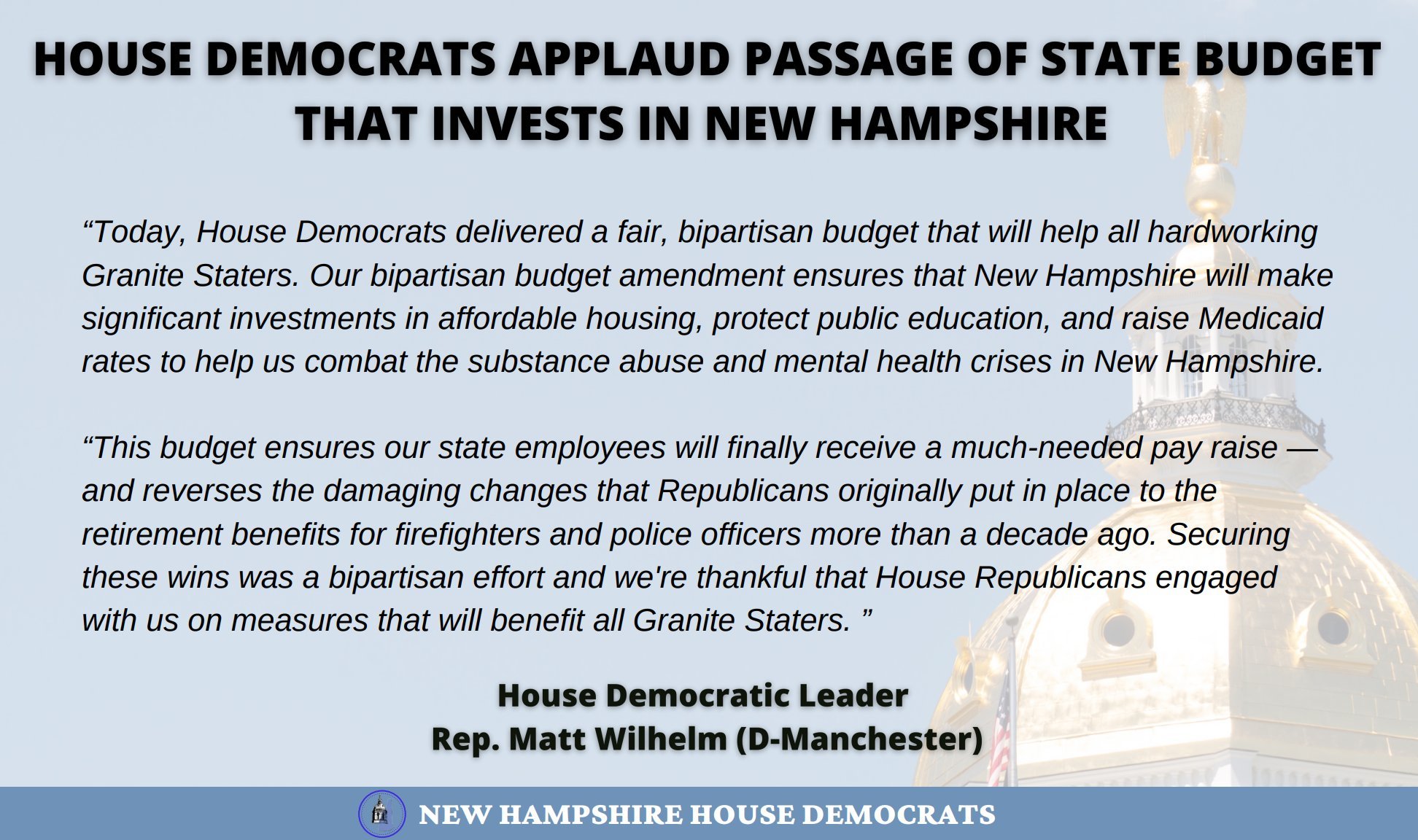This budget is one that tackles a broad range of challenges currently facing our state. However, as with any budget compromise, it is not perfect. There are policies within it that Democrats fought strongly against, like the continued downshifting of expenses to property taxpayers through a massive tax cut for the ultra-rich, which they do not need nor did they ask for. Frankly, too, we remain concerned about performance politics on our northern border that will waste $1.4 million dollars. It is also disappointing that retirement benefits for police and firefighters were excluded from the budget, but we won’t stop fighting for our first responders.
Ultimately though, despite hard compromise, this budget does incredible things for Granite Staters during a time of economic uncertainty. Granite Staters looked to their elected officials to come together to pass a budget that will meet their needs, and we did it. This budget is an actionable, multi-faceted plan to address the issues that most directly impact the constituents we serve.
The New Hampshire House Democrats voted to pass a historically bipartisan state budget, securing a deal that addresses Granite Staters’ concerns and helps deliver the resources families need to thrive. This budget reflects many of the urgent needs we hear about time and again from every community across New Hampshire.
Thanks to collaborative work, this budget is truly different from budgets we have crafted in recent years. The magnitude of stakeholders who showed up to lend their voices — legislators, advocates, community leaders, parents, teachers, and others — led to support for dozens of policies that work for all Granite Staters.
If you’ve tried to find housing in New Hampshire, you are acutely aware that the cost of rent is rising nearly 20% year-over-year, which is unsustainable for workers and young families. To alleviate this crisis, Democrats fought to include $25 million for the Affordable Housing Fund, $10 million for InvestNH, and $5.25 million for the newly formed Housing Champions program. Together, these programs implement new incentives for cities and towns to build and maintain affordable housing. The budget also provides $10 million for shelters to support our unhoused neighbors, ensuring that all Granite Staters are able to find a safe and accessible place to live, even in the short-term. We didn’t stop there.
Another key priority for Democrats throughout this process has been securing a significant investment in public education. From the beginning, we’ve been clear: all New Hampshire students are entitled to high quality public schools and an education that does not overburden local property taxpayers. We know schools are not just places where students learn and grow — they are community hubs, upheld and enriched by our public school teachers and by our neighbors. This is why we advocated for a budget that invests $169 million in public education, with specific provisions for the schools and students that need it most. These investments put New Hampshire students first, while providing the necessary funds to protect education access for all.
Expanding health care access, and equally prioritizing mental and physical health, was also at the top of the Democratic priority list. Hundreds of thousands of Granite Staters have relied on expanded Medicaid access for their health care. Together, we were able to reauthorize our Medicaid expansion program for seven years and significantly increase Medicaid provider reimbursement rates.
We know that our health care workforce shortage has affected our residents’ ability to access the health care they need, and with this increase in provider rates, health care facilities will be better positioned to hire and retain staff. A healthy workforce is crucial to the health of our state overall, and this budget takes the necessary steps to ensure that.
We were also able to provide support for our young working families in this budget. To confront New Hampshire’s severe child care crisis, where 16,000 Granite Staters on average cannot work because they are caring for a child, we voted for increased funding for child care and Family Resource Centers. This shortage has a devastating impact on the state’s workforce potential and our entire economy and has for far too long.
Without question, the Democratic initiatives we championed into the budget are exactly what makes this budget work for all Granite Staters. Compromise, commitment, and the advocacy of so many is what made this budget happen. With these investments, we are confident that this budget brings positive change to communities across New Hampshire, ensuring that every citizen reaps the benefits of the Granite Advantage
Sen. Donna Soucy, Rep Matt Wilhelm editorial in the Manchester Union Leader June 2023




